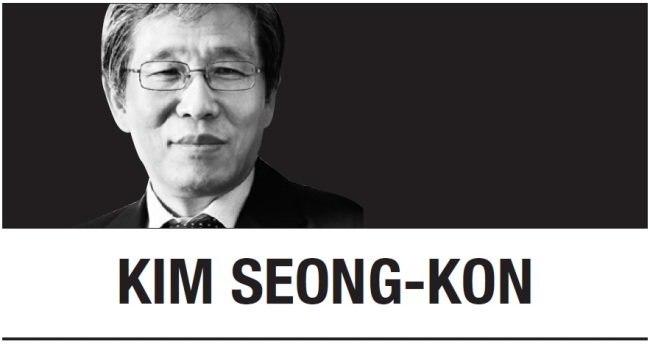[Kim Seong-kon] Lest we forget we were tadpoles once
By Kim Seong-konPublished : April 3, 2018 - 17:29
 Recently, while strolling through the National Mall in Washington, I stumbled into the Korean War Veterans Memorial. There I found statues of American soldiers who died during the Korea War. They were all wearing heavy winter military capes, indicating that they had to fight in the severely cold winter of the Korean Peninsula.
Recently, while strolling through the National Mall in Washington, I stumbled into the Korean War Veterans Memorial. There I found statues of American soldiers who died during the Korea War. They were all wearing heavy winter military capes, indicating that they had to fight in the severely cold winter of the Korean Peninsula. On the plaque next to the statues was carved the number of those killed and wounded during the Korean War: 54,246 American soldiers and 628,833 UN soldiers were killed in action. The names of the 21 countries that dispatched their young men to risk their lives for the freedom of South Korea were carved as well.
Standing before the memorial, I could not help but feel ashamed. Why don’t we have a similar memorial at City Hall or Gwanghwamun Square so people can easily access it and reflect on the many sacrifices made during the war? How many Korean people know the exact number of soldiers who were killed or wounded for them during the Korean War, whether domestic or foreign?
How many of us remember the names of the 16 countries that sent combat troops to save us from the invasion of the communists? How about the five nations that sent medical units to war-ridden Korea? And how many of us are grateful to those who died for us and realize that without the UN soldiers’ noble sacrifice, South Korea could not have existed today?
Regrettably, today’s Korean people no longer seem to care. To make matters worse, some of us have even blamed the United States for the war by asserting that it was a proxy war between the US and the Soviet Union. But history has already revealed that this is not true. Yet young Koreans -- who were born after the war and therefore do not know the full facts and are presumably brainwashed by their politically radical teachers -- do not hesitate to insult those who sacrificed their lives for South Korea, while keeping silent about the country that actually started it.
Contrary to those people’s groundless accusations, there are tons of reasons for Koreans to be grateful to the US.
For example, US Navy Capt. Leonard P. LaRue saved the lives of 14,000 Korean refugees during the Heungnam Evacuation in 1950. His ship, Meredith Victory, was already fully loaded with weapons, including tanks and armored vehicles, and therefore there was no more available space. However, Capt. LaRue decided to abandon the weapons to create space for the 14,000 refugees who would have been abandoned and killed otherwise.
While I was brooding on the gloomy past and present of the Korean Peninsula, something happened that brightened my mood. Three Korean colonels from the ROK Army, Navy, and Air Force brought a flower wreath that said, “We will never forget your sacrifice.” Indeed, we should never forget the American soldiers who died for us and the favors we have received from the US during and after the Korean War. Although Washington may have made some mistakes in foreign policy affecting South Korea negatively, it would be wrong for us to be frivolously swept up by blind anti-American sentiment. That would be exactly what North Korea wants.
What, then, instigated anti-American sentiment in South Korea? There is a general consensus that anti-American sentiment in South Korea stemmed from the Gwangju Uprising in 1980, when the citizens of Gwangju revolted against the military coup of Gen. Chun Doo-hwan and were put down. At the time, Koreans were deeply disappointed that the US did not support and rescue the people of Gwangju.
Another reason for the rise of anti-American sentiment in South Korea was the spread of the Juche ideology of North Korean leader Kim Il-sung among the student leaders of South Korea in the mid-1980s.
According to Kim Young-ha’s “Your Republic Is Calling You,” in 1986 with “Seoul National University leading the way, Juche ideology was at the cusp of popularity, poised to spread across college campuses nationwide.” Since the Juche ideology preaches self-reliance and freedom from foreign interference, it naturally entailed and nurtured anti-American sentiment.
Regardless of pro-American or anti-American sentiment, however, blaming America for the Korean War, is like barking up the wrong tree. America was the country that came to rescue us, not to harm us. Instead of criticizing America, therefore, we should cherish and honor the Korea-US Mutual Defense Treaty, without which South Korea would never have been able to enjoy today’s economic prosperity and national security. Washington, too, should always take the safety of South Korea into account when it deals with the nuclear issues of North Korea.
There is a Korean maxim that says, “A frog forgets he was once a tadpole.” One problem with those who become rich and famous overnight is that they can be arrogant and presumptuous. If you are well-off, however, you should have decency, integrity, and noblesse oblige in accordance with your wealth. Also, you should not forget the favors you received from others when you were destitute and desperate. A frog should remember he was a tadpole once.
Kim Seong-kon
Kim Seong-kon is a professor emeritus of English at Seoul National University and distinguished visiting professor at George Washington University. He can be reached at sukim@snu.ac.kr –Ed.


















![[Today’s K-pop] Treasure to publish magazine for debut anniversary](http://res.heraldm.com/phpwas/restmb_idxmake.php?idx=642&simg=/content/image/2024/07/26/20240726050551_0.jpg&u=)